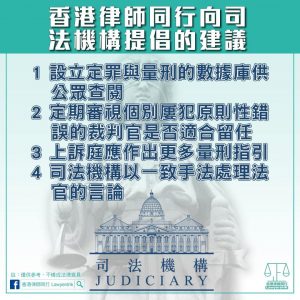Lawyers HK – Recommendations to the Judiciary

Recent court judgments for cases related to the social events that occurred as a result of the extradition bill have attracted intense public scrutiny and criticism. The Judiciary has received a large number of complaints.
As lawyers, we have utmost respect for the independence of the Judiciary. We are strongly of the view that the courts should not be interfered in any way whilst making judgments in respect of cases before it. However, a material number of Hong Kong residents have expressed the lack of confidence in the impartiality of the courts, and as a result, have expressed a lack of faith in the judicial system itself. In relation to this, we set out below our recommendations to the Honorable Chief Justice Geoffrey Ma and the Judiciary which he represents:
1. Setting up public database to provide statistics on conviction and sentencing
As of today, the judgements of Magistrates’ Courts are generally not available in written format, and there is no publicly available documentary record on the related sentences. The public are unable to find out about the judgment or sentencing except through media reports, and the public are also unable to ascertain (given lack of information) whether any specific magistrate demonstrates unwarranted presuppositions in deciding on his/her judgment or sentencing.
We recommend to the Judiciary that all cases that are heard before Magistrates’ Courts which are related to the recent social events or otherwise related to public order should have the related judgment, sentencing, and results of any appeal or review, systematically cataloged. Such data should be made publicly available, which would permit the public to search and review. This would increase transparency and can serve as a way to monitor the impartiality of the courts in a data-driven way, and we believe this can help rebuild the public’s confidence in the Judiciary.
2. Periodic review of the suitability of Magistrates who repeatedly err in principle in their judgments
In his 23rd September statement, the Honourable Chief Justice Geoffrey Ma stated that “where there is any dissatisfaction over the sentences imposed by the courts, any redress ought to be taken up by means of an appeal or review” and “the Secretary for Justice can apply to the Court of Appeal for the review of any sentence on the grounds that the sentence is not authorised by law, is wrong in principle or is manifestly inadequate or manifestly excessive”. We agree that the appeal and review mechanism can correct errors (if any) made in the trial Magistrate’s judgment.
But in recent days, there have been repeated cases of manifestly inadequate judgments sentences. One of the more obvious examples would be Magistrate Kelly Shui. Just within this week on two consecutive days (22nd and 23rd September), the Court of Appeal dealt with two appeals resulting from manifestly inadequate sentencing by this Magistrate (CAAR1/2020 and CAAR7/2020). The Court of Appeal clearly stated that the Magistrate erred in principle, and in sentencing, only focused on the defendant’s rehabilitation and disregarded other aggravating factors, and resulted in a manifestly inadequate sentence.
The appointments of Magistrates are generally on a contract basis. We hope that the Judiciary would be able to conduct periodic review of the suitability of Magistrates who repeatedly err in principle in their judgments, so as to maintain and guarantee the quality of the judgments at the Magistracy level, as well as to ensure that the society’s limited resources can be used efficiently, effectively and in a responsible manner, so that the Department of Justice would not need to repeatedly appeal or apply for review of the judgments of certain specific Magistrates.
3. Court of Appeal should provide more sentencing guidelines
As Hong Kong has not seen any large-scale riot or street violence since 1960s, we have very limited case law on these subjects. The opposition to the extradition bill has given rise to a large number of criminal cases. In order to avoid substantial discrepancies in sentencing and controversies arising from such discrepancies, we suggest that the Court of Appeal should provide more sentencing guidelines. This will enable Magistrates to sentence with more consistent sentencing principles and provide the public with a better understanding of the consequences of breaching the law so that they can have a stronger sense of complying with the law. Issuing sentencing guidelines will not constitute any interference in the sentencing by courts. We consider this to be more appropriate and less controversial than establishing a sentencing committee.
4. Consistent treatment of comments made by judicial officers
We note that after District Judge WK Kwok made a comment commending the defendant as being noble when sentencing the defendant in April this year for slashing a person, he did express regret at the same time that he could not sentence leniently.
Ma CJ thereafter issued a statement stating judges and judicial officers must refrain from unnecessarily expressing public any political view, as this may compromise the appearance of impartiality. Ma CJ decided to temporarily suspend the District Judge from hearing any case of a similar political context.
However, we also note that in May this year, when Magistrate Kelly Shui sentenced a 15 year-old male student who threw a petrol bomb to air his frustrations on the government, the pro-establishment camp and the police, she praised the defendant, who had to repeat in Form 3 due to poor academic result, as a “superb youngster”. This resulted in a public outcry, and the Court of Appeal also questioned the appropriateness of her description.
We note that Magistrate Kelly Shui has not been similarly suspended from hearing cases of a political context, and this has given rise to serious doubts on whether the Judiciary is being impartial in its treatment.
We urge the Judiciary to be consistent in its treatment of all judicial officers when any one has expressed any inappropriate or unnecessary political view, or else the credibility of the Judiciary will be affected.
As part of the legal profession, we are deeply concerned with the public’s loss of confidence in the judicial system. We believe that criticism of the public who are expressing dissatisfaction with the judicial system without actually addressing the public’s concerns is not conducive to rebuilding confidence. It is indisputable that the public have the right to discuss any court judgment. To help the public regain confidence in the judicial system, and provided always that the independence of the Judiciary is robustly defended and upheld, we believe that it is necessary to introduce public and transparent systems which can help ensure that no individual judge would be able to permit his/her personal political views to overshadow the Rule of Law.
We do not intend to criticize any individual judicial officer here, and we do not find it meaningful to go back and forth on this. We only hope to make some constructive recommendations. We hope that fellow members of the profession can put aside their political views and defend the Rule of Law, which has been the cornerstone of the success of Hong Kong. Let history be the witness of our generation of lawyers who are impartial and who fiercely defend the Rule of Law!
Lawyers HK
26 September 2020







